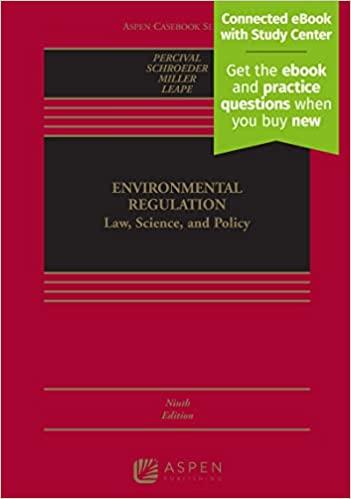Question
The summons: A. gives the court personal jurisdiction over the defendant. B.officially starts the action in federal court. C.provides the defendant with notice of the
The summons: A. gives the court personal jurisdiction over the defendant. B.officially starts the action in federal court. C.provides the defendant with notice of the lawsuit so a defense can be prepared. D.is not required in some states.
Except when the federal waiver of service is used, at the start of a civil lawsuit the defendant must be served with the: A.summons and warrant for arrest. B.affidavit of service and acknowledgement. C.summons and complaint. D.complaint and proof of service.
PACER allows electronic access to: A.sealed documents for attorneys only. B.federal court documents for anyone. C.court dockets for attorneys only. D.court rule changes under consideration.
The e-filing system for many federal courts is: A.CM/ECF. B.PACER. C.NEF. D.uscourts.gov
The Federal Rules of Civil Procedure do not allow service of process by: A.personal delivery. B.delivery to any person at defendant's house. C.delivery by first-class mail. D.publication under prescribed circumstances.
Generally speaking, in order for a long-arm statute to extend to an individual or a corporation, the individual or corporation must have: A.state long-arm certification. B.its primary place of business in the state. C.the necessary minimum contacts with the federal court. D.the necessary minimum contacts with the state.
Service of papers subsequent to the complaint A.is covered in Rule 5 of the Federal Rules of Civil Procedure. B.is directly on the party, not the party's attorney. C.must be preceded by filing them with the clerk of court. D.must be in person.
The Federal Rules of Civil Procedure give the court the power to dismiss a lawsuit if, after the complaint has been filed, service has not been achieved within: A.120 B.60 C.30 D.90
Default may be entered if the: A.defendant fails to enter an appearance or otherwise file a responsive pleading in the prescribed time period. B.plaintiff fails to enter an appearance or otherwise file a responsive pleading in the prescribed time period. C.defendant files a responsive pleading but fails to enter an appearance in the prescribed time period. D.defendant is a minor and has no legal representation.
The summons is the document that states the time in which the plaintiff must appear and defend: True False
Out-of-state defendants can be served through long-arm laws if they have sufficient contacts with the plaintiff: True False
A default judgment against one defendant may preclude proceeding against other defendants: True False
Entry of a default judgment ends the case in favor of the plaintiff: True False
Case deadlines stem from the initial client interview: True False
Service of process establishes personal venue: True False
Internet contacts are insufficient for the use of long-arm statutes: True False Papers subsequent to the complaint should be served on the party's attorney: True False
A defendant who returns waiver of service waives defenses and objections to the complaint: True False
A default judgment hearing requires evidence to prove a cause of action: True False
Step by Step Solution
There are 3 Steps involved in it
Step: 1

Get Instant Access to Expert-Tailored Solutions
See step-by-step solutions with expert insights and AI powered tools for academic success
Step: 2

Step: 3

Ace Your Homework with AI
Get the answers you need in no time with our AI-driven, step-by-step assistance
Get Started


